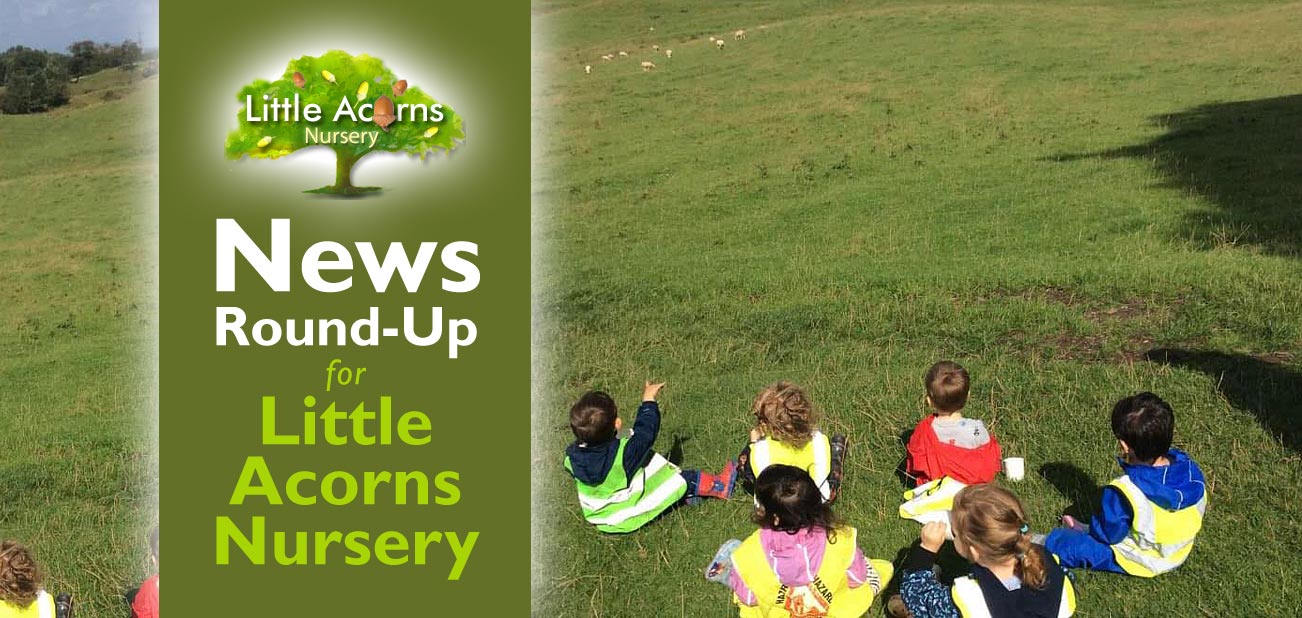
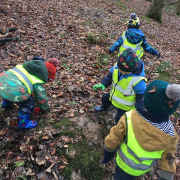 Having previously published guides and useful information here for parents, we thought it was time for a news round-up to highlight some of the wonderful activities that have been taking place with children at Little Acorns Nursery. Both children and staff have been extremely busy indeed, with exciting new initiatives, outings, special visits and extra-curricular activities. Let’s take a look at some of the most recent.
Having previously published guides and useful information here for parents, we thought it was time for a news round-up to highlight some of the wonderful activities that have been taking place with children at Little Acorns Nursery. Both children and staff have been extremely busy indeed, with exciting new initiatives, outings, special visits and extra-curricular activities. Let’s take a look at some of the most recent.
Forest School Sessions to Start the Year
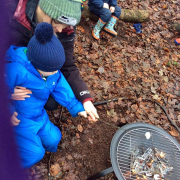 January began the new term with exciting Forest School sessions for our little ones. As well as trips to local countryside, woodland and natural open spaces, the pre-school children and ‘Rising 3s’ at Little Acorns learnt all about fire safety and its importance. (Take a look at the small photographs to see the various activities — click any for a larger view).
January began the new term with exciting Forest School sessions for our little ones. As well as trips to local countryside, woodland and natural open spaces, the pre-school children and ‘Rising 3s’ at Little Acorns learnt all about fire safety and its importance. (Take a look at the small photographs to see the various activities — click any for a larger view).
The children also enjoyed making some much-needed bird feeders for the local birds, many of whom struggle for food during the winter months. This coincided nicely with the RSPB’s Big Garden Birdwatch, which happens during the last week of January each year. During the annual event, both children and adults are asked to spend one hour outdoors to count up how many birds they see and which species they belong to. 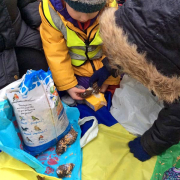 This is important for bird conservation, bearing in mind that the UK bird population has fallen by a staggering 38 million birds in only 50 years. Sadly, even some birds that may have been thought of as common are now in trouble — the starling, for example, is now on the RSPB’s ‘Red List’ — their list of birds whose populations have declined to worrying levels. Such birds need all the help they can get from us, so it’s good for children to be aware of the importance of conservation and caring for wild creatures.
This is important for bird conservation, bearing in mind that the UK bird population has fallen by a staggering 38 million birds in only 50 years. Sadly, even some birds that may have been thought of as common are now in trouble — the starling, for example, is now on the RSPB’s ‘Red List’ — their list of birds whose populations have declined to worrying levels. Such birds need all the help they can get from us, so it’s good for children to be aware of the importance of conservation and caring for wild creatures.
“Not all classrooms have four walls.”
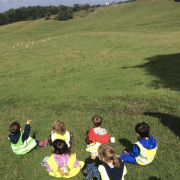 Forest School gives children access to the Great Outdoors so that they can learn all about nature and the natural environment — and also about themselves. As well as being educational and fun, spending time outdoors with nature has many benefits for children and some of these were previously explored here on the blog. Amongst other things, it teaches them new skills and even some they probably didn’t know they had — leadership, teamwork, critical thinking and problem-solving skills, for example. Learn more about Forest School in our comprehensive guide here.
Forest School gives children access to the Great Outdoors so that they can learn all about nature and the natural environment — and also about themselves. As well as being educational and fun, spending time outdoors with nature has many benefits for children and some of these were previously explored here on the blog. Amongst other things, it teaches them new skills and even some they probably didn’t know they had — leadership, teamwork, critical thinking and problem-solving skills, for example. Learn more about Forest School in our comprehensive guide here.
Extra-Curricular Activities & New Skills
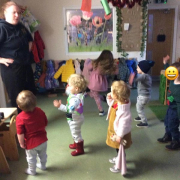 Babies and under-five children at Little Acorns Nursery are fortunate to have access to some fun, exciting and educational activities. These are optional but are very popular amongst the little ones. As well as the day-to-day activities and curriculum at the nursery, we also offer:
Babies and under-five children at Little Acorns Nursery are fortunate to have access to some fun, exciting and educational activities. These are optional but are very popular amongst the little ones. As well as the day-to-day activities and curriculum at the nursery, we also offer:
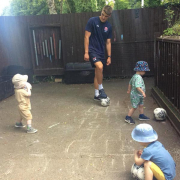 Preschool Drama Sessions, where children get to act, role-play and entertain each other in fun and beneficial ways.
Preschool Drama Sessions, where children get to act, role-play and entertain each other in fun and beneficial ways.
Baby Farm Animals Visit the Children
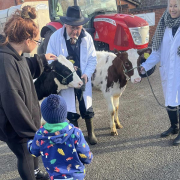 During January, the children were delighted when they had a surprise meeting with 2 wonderful twelve-week-old baby cows, called Louise and Jenny. Both calves and children were intrigued to meet each other and it was an opportunity that many children may otherwise not have had access to. Special thanks go to one of our lovely parents, who kindly facilitated this magical event with the loan of their beautiful calves.
During January, the children were delighted when they had a surprise meeting with 2 wonderful twelve-week-old baby cows, called Louise and Jenny. Both calves and children were intrigued to meet each other and it was an opportunity that many children may otherwise not have had access to. Special thanks go to one of our lovely parents, who kindly facilitated this magical event with the loan of their beautiful calves.
Weekly Visits to the Library
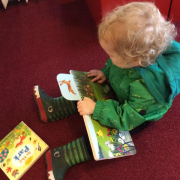 One of Little Acorns Nursery’s regular features is our weekly visits to the local library with the children. There, they are able to independently look through their favourite books as well as discovering new ones. Encouraging a love of reading is hugely important as it’ll lead to an understanding of a wider range of topics, it will improve language skills, enhance cognitive development and teach them so much about — well — potentially everything!
One of Little Acorns Nursery’s regular features is our weekly visits to the local library with the children. There, they are able to independently look through their favourite books as well as discovering new ones. Encouraging a love of reading is hugely important as it’ll lead to an understanding of a wider range of topics, it will improve language skills, enhance cognitive development and teach them so much about — well — potentially everything!
The Children Visit a Local Care Home
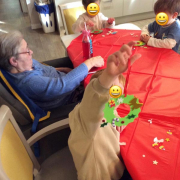 Children also enjoy their monthly visit to the local care home. It’s a great opportunity to meet and interact with the care home residents, who also really appreciate the youngsters’ company. Children and adults will bond as they talk, sing and even share in craft activities together. It’s a wonderful experience for all parties, teaching children many lessons about life and the importance of community, as well as enhancing communication and social skills. It also really brightens the day for the care home residents.
Children also enjoy their monthly visit to the local care home. It’s a great opportunity to meet and interact with the care home residents, who also really appreciate the youngsters’ company. Children and adults will bond as they talk, sing and even share in craft activities together. It’s a wonderful experience for all parties, teaching children many lessons about life and the importance of community, as well as enhancing communication and social skills. It also really brightens the day for the care home residents.
Gruffalo Crumble in Storytelling Week
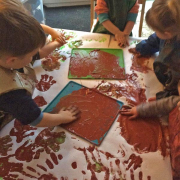 As January became early February, toddlers at Little Acorns Nursery had great fun celebrating Storytelling Week in creative ways. Running between 30th January to 5th February, the event saw children doing things like making their own ‘Gruffalo Crumble’ and ‘Gruffalo Woods’ as well as playing in our ‘Blue River’. The accompanying photo (right) illustrates one of the many creative story-themed activities that the children enjoyed.
As January became early February, toddlers at Little Acorns Nursery had great fun celebrating Storytelling Week in creative ways. Running between 30th January to 5th February, the event saw children doing things like making their own ‘Gruffalo Crumble’ and ‘Gruffalo Woods’ as well as playing in our ‘Blue River’. The accompanying photo (right) illustrates one of the many creative story-themed activities that the children enjoyed.
Vegetable & Fruit Growing at the Nursery
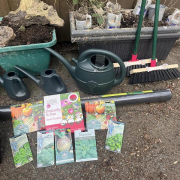 By mid-February, staff and children at the nursery had begun to prepare for another nature-themed activity – the growing of our own vegetables and fruit! So, various seed packets were procured and preparation for sowing the seeds and eventually growing our own produce commenced. The plan is to incorporate this activity into daily nursery life. Children will thereby start to understand the importance of nurturing living plants and the benefits of growing their own food. They’ll learn to be responsible, they’ll learn new things about nature, where food comes from and the importance of tending their own vegetable patch at the nursery. It’s a thoroughly worthwhile and fulfilling activity for them to enjoy too.
By mid-February, staff and children at the nursery had begun to prepare for another nature-themed activity – the growing of our own vegetables and fruit! So, various seed packets were procured and preparation for sowing the seeds and eventually growing our own produce commenced. The plan is to incorporate this activity into daily nursery life. Children will thereby start to understand the importance of nurturing living plants and the benefits of growing their own food. They’ll learn to be responsible, they’ll learn new things about nature, where food comes from and the importance of tending their own vegetable patch at the nursery. It’s a thoroughly worthwhile and fulfilling activity for them to enjoy too.
We were also delighted when one kind grandmother noticed our Facebook post about this food growing activity and offered us some spare strawberry plants. A huge thanks to her for those and we’re now looking forward to a crop of delicious strawberries too!
An Outstanding Childcare Service & Forest School in Clayton-le-Woods, Chorley

 If you have a child under five and are looking for the best childcare in Lancashire, explore the opportunity of sending your baby, toddler or preschooler to our outstanding nursery and pre-school. Please get in touch to register your child for a nursery or pre-school place, request a guided tour of the setting or simply to ask any questions. Our staff are always happy to answer queries and to show families around this wonderful childcare setting. Please choose a button to get started:
If you have a child under five and are looking for the best childcare in Lancashire, explore the opportunity of sending your baby, toddler or preschooler to our outstanding nursery and pre-school. Please get in touch to register your child for a nursery or pre-school place, request a guided tour of the setting or simply to ask any questions. Our staff are always happy to answer queries and to show families around this wonderful childcare setting. Please choose a button to get started:
Little Acorns Nursery offers award-winning childcare in Central Lancashire. We are a nursery and pre-school located in Clayton-le-Woods, Chorley, also being convenient for families in Clayton Brook, Clayton Green, Thorpe Green, Pippin Street, Buckshaw Village, Whittle-le-Woods, Farington, Bamber Bridge, Lostock Hall, Euxton, Leyland and Penwortham.

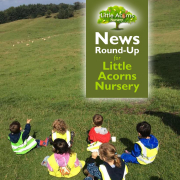
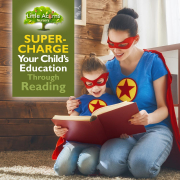
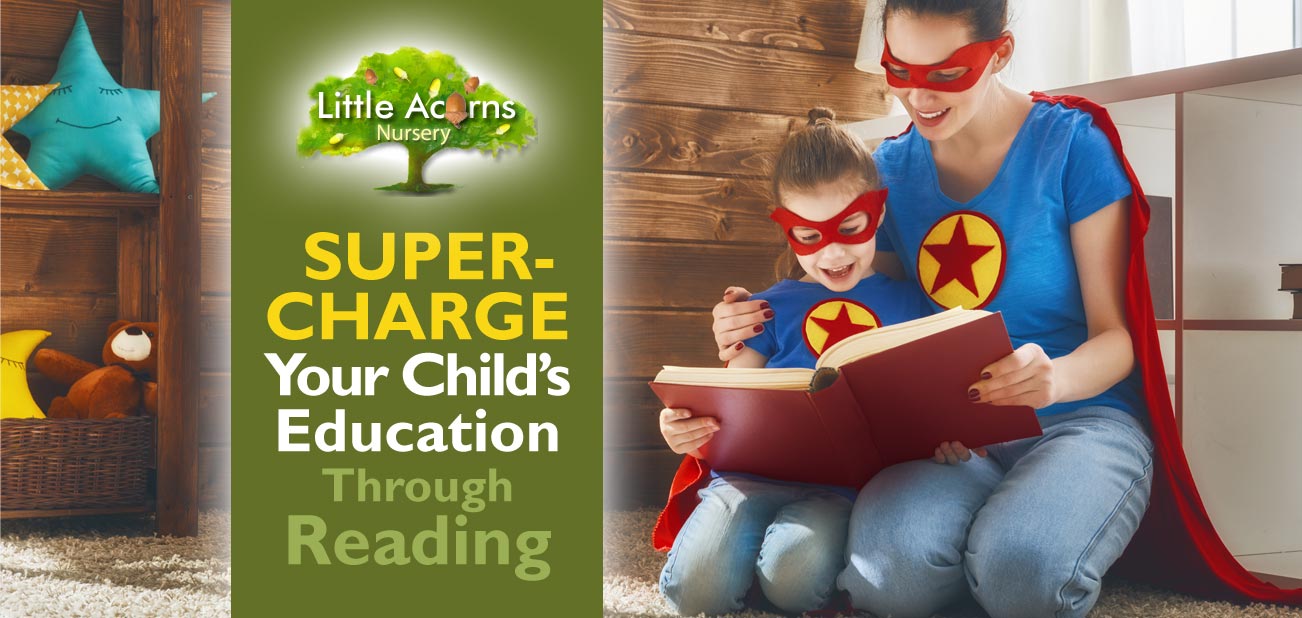
 Last year, we wrote a detailed post outlining
Last year, we wrote a detailed post outlining 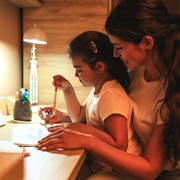 Interestingly, under-five children who came from disadvantaged backgrounds were shown to benefit even more than those who didn’t. For this reason, reading with parents/carers has been proposed as a possible way to close the performance deficit often seen with children from such backgrounds. It may well represent a perfect solution to even up the playing field.
Interestingly, under-five children who came from disadvantaged backgrounds were shown to benefit even more than those who didn’t. For this reason, reading with parents/carers has been proposed as a possible way to close the performance deficit often seen with children from such backgrounds. It may well represent a perfect solution to even up the playing field. Deeper bonds with parents/carers (after all, this is quality time spent together, one-to-one);
Deeper bonds with parents/carers (after all, this is quality time spent together, one-to-one);